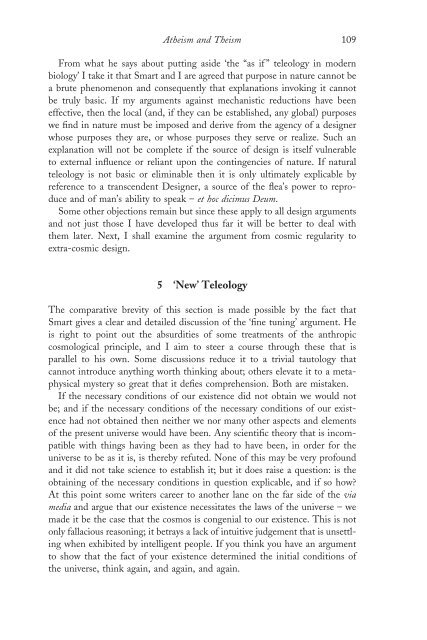Atheism and Theism JJ Haldane - Common Sense Atheism
Atheism and Theism JJ Haldane - Common Sense Atheism
Atheism and Theism JJ Haldane - Common Sense Atheism
You also want an ePaper? Increase the reach of your titles
YUMPU automatically turns print PDFs into web optimized ePapers that Google loves.
<strong>Atheism</strong> <strong>and</strong> <strong>Theism</strong> 109<br />
From what he says about putting aside ‘the “as if ” teleology in modern<br />
biology’ I take it that Smart <strong>and</strong> I are agreed that purpose in nature cannot be<br />
a brute phenomenon <strong>and</strong> consequently that explanations invoking it cannot<br />
be truly basic. If my arguments against mechanistic reductions have been<br />
effective, then the local (<strong>and</strong>, if they can be established, any global) purposes<br />
we find in nature must be imposed <strong>and</strong> derive from the agency of a designer<br />
whose purposes they are, or whose purposes they serve or realize. Such an<br />
explanation will not be complete if the source of design is itself vulnerable<br />
to external influence or reliant upon the contingencies of nature. If natural<br />
teleology is not basic or eliminable then it is only ultimately explicable by<br />
reference to a transcendent Designer, a source of the flea’s power to reproduce<br />
<strong>and</strong> of man’s ability to speak – et hoc dicimus Deum.<br />
Some other objections remain but since these apply to all design arguments<br />
<strong>and</strong> not just those I have developed thus far it will be better to deal with<br />
them later. Next, I shall examine the argument from cosmic regularity to<br />
extra-cosmic design.<br />
5 ‘New’ Teleology<br />
The comparative brevity of this section is made possible by the fact that<br />
Smart gives a clear <strong>and</strong> detailed discussion of the ‘fine tuning’ argument. He<br />
is right to point out the absurdities of some treatments of the anthropic<br />
cosmological principle, <strong>and</strong> I aim to steer a course through these that is<br />
parallel to his own. Some discussions reduce it to a trivial tautology that<br />
cannot introduce anything worth thinking about; others elevate it to a metaphysical<br />
mystery so great that it defies comprehension. Both are mistaken.<br />
If the necessary conditions of our existence did not obtain we would not<br />
be; <strong>and</strong> if the necessary conditions of the necessary conditions of our existence<br />
had not obtained then neither we nor many other aspects <strong>and</strong> elements<br />
of the present universe would have been. Any scientific theory that is incompatible<br />
with things having been as they had to have been, in order for the<br />
universe to be as it is, is thereby refuted. None of this may be very profound<br />
<strong>and</strong> it did not take science to establish it; but it does raise a question: is the<br />
obtaining of the necessary conditions in question explicable, <strong>and</strong> if so how?<br />
At this point some writers career to another lane on the far side of the via<br />
media <strong>and</strong> argue that our existence necessitates the laws of the universe – we<br />
made it be the case that the cosmos is congenial to our existence. This is not<br />
only fallacious reasoning; it betrays a lack of intuitive judgement that is unsettling<br />
when exhibited by intelligent people. If you think you have an argument<br />
to show that the fact of your existence determined the initial conditions of<br />
the universe, think again, <strong>and</strong> again, <strong>and</strong> again.

















